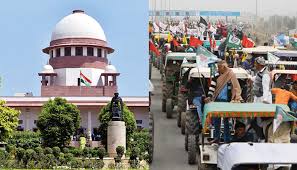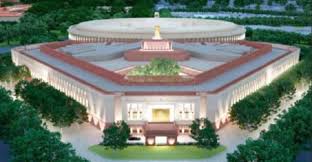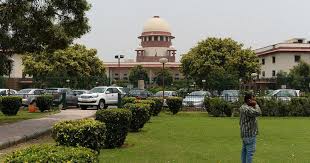Feature
Supreme Court says making casteist slur on SC/STs over phone an offence

New Delhi: The honorable Supreme Court has made provision that it is a punishable offense to call a Scheduled Caste or Scheduled Tribe SC/ST to a person in a public place by using word casteist. The person found guilty can be jailed for a maximum of five years.
The apex court refused to ban the criminal proceedings in such a case and did not dismiss the FIR registered against the accused. The guilty person used to call a SC/ST woman as caste and indecent words on the phone.
The Supreme Court has ruled that using casteist remarks over phone in a public place against the Scheduled Caste and Scheduled Tribe category amounts to criminal offence, warranting a jail of a maximum five years.
The apex court refused to stay criminal proceedings and quash an FIR against a person, who allegedly used derogatory casteist remarks over phone to a woman from the the SC/ST category.
A bench of Justices J. Chelameswar and S. Abdul Nazeer declined to interfere with the August 17 order of the Allahabad High Court, which rejected the plea of a Uttar Pradesh resident, seeking quashing of the FIR against him by the woman.
It dismissed his plea saying he has to prove during the trial that he had not talked to the woman over phone in a public place.
Supreme Court rules using casteist remarks over phone on SC/STs is criminal offence:
Advocate Vivek Vishnoi, appearing for the accused, said that at the time of the said conversation, both the woman and his client were in different cities and it could not be stated that it was in public view.
He said that section 3(1)(s) of SC/ST Act relates to a person, who abuses any member of a SC or ST by caste name in any place “within public view”.
“In this case, both persons were in different cities and the conversation took place over the phone, which can’t be said to be in a public view. This was a private conversation. The apex court had already settled what ‘public view’ means in its earlier verdict of 2008,” he said.
Vishnoi said the issue involved in the petition was that whether a private conversation on mobile phone between two individuals can come within the ambit of expression “within public view”.
He said that by no stretch of imagination, a private conversation between two indviduals on mobile phone can come within the ambit of expression “within public view” and that the charges framed against the petitioner need to be quashed.
The lawyer further said that the complainant has made some vague allegations regarding land sale transactions but no specific averments were made which may prima facie show that offence of cheating and intimidation were made out.
The bench, however, refused to agree with the contention and said it was only in the trial that the accused could prove if he was talking on phone in public view or not.
Entertainment
Meghalaya Reserves Legalized Gambling and Sports Betting for Tourists

The State Scores Extra High on Gaming-Friendly Industry Index
Meghalaya scored 92.85 out of 100 possible points in a Gaming Industry Index and proved to be India’s most gaming-friendly state following its recent profound legislation changes over the field allowing land-based and online gaming, including games of chance, under a licensing regime.
The index by the UK India Business Council (UKIBC) uses a scale of 0 to 100 to measure the level of legalisation on gambling and betting achieved by a state based on the scores over a set of seven different games – lottery, horse racing, betting on sports, poker, rummy, casino and fantasy sports
Starting from February last year, Meghalaya became the third state in India’s northeast to legalise gambling and betting after Sikkim and Nagaland. After consultations with the UKIBC, the state proceeded with the adoption of the Meghalaya Regulation of Gaming Act, 2021 and the nullification of the Meghalaya Prevention of Gambling Act, 1970. Subsequently in December, the Meghalaya Regulation of Gaming Rules, 2021 were notified and came into force.
All for the Tourists
The move to legalise and license various forms of offline and online betting and gambling in Meghalaya is aimed at boosting tourism and creating jobs, and altogether raising taxation revenues for the northeastern state. At the same time, the opportunities to bet and gamble legally will be reserved only for tourists and visitors.
“We came out with a Gaming Act and subsequently framed the Regulation of Gaming Rules, 2021. The government will accordingly issue licenses to operate games of skill and chance, both online and offline,” said James P. K. Sangma, Meghalaya State Law and Taxation Minister speaking in the capital city of Shillong. “But the legalized gambling and gaming will only be for tourists and not residents of Meghalaya,” he continued.
To be allowed to play, tourists and people visiting the state for work or business purposes will have to prove their non-resident status by presenting appropriate documents, in a process similar to a bank KYC (Know Your Customer) procedure.
Meghalaya Reaches Out to a Vast Market
With 140 millions of people in India estimated to bet regularly on sports, and a total of 370 million desi bettors around prominent sporting events, as per data from one of the latest reports by Esse N Videri, Meghalaya is set to reach out and take a piece of a vast market.
Estimates on the financial value of India’s sports betting market, combined across all types of offline channels and online sports and cricket predictions and betting platforms, speak about amounts between $130 and $150 billion (roughly between ₹9.7 and ₹11.5 lakh crore).
Andhra Pradesh, Telangana and Delhi are shown to deliver the highest number of bettors and Meghalaya can count on substantial tourists flow from their betting circles. The sports betting communities of Karnataka, Maharashtra, Uttar Pradesh and Haryana are also not to be underestimated.
Among the sports, cricket is most popular, registering 68 percent of the total bet count analyzed by Esse N Videri. Football takes second position with 11 percent of the bets, followed by betting on FIFA at 7 percent and on eCricket at 5 percent. The last position in the Top 5 of popular sports for betting in India is taken by tennis with 3 percent of the bet count.
Local Citizens will Still have Their Teer Betting
Meghalaya residents will still be permitted to participate in teer betting over arrow-shooting results. Teer is a traditional method of gambling, somewhat similar to a lottery draw, and held under the rules of the Meghalaya Regulation of the Game of Arrow Shooting and the Sale of Teer Tickets Act, 2018.
Teer includes bettors wagering on the number of arrows that reach the target which is placed about 50 meters away from a team of 20 archers positioned in a semicircle.
The archers shoot volleys of arrows at the target for ten minutes, and players place their bets choosing a number between 0 and 99 trying to guess the last two digits of the number of arrows that successfully pierce the target.
If, for example, the number of hits is 256, anyone who has bet on 56 wins an amount eight times bigger than their wager.























